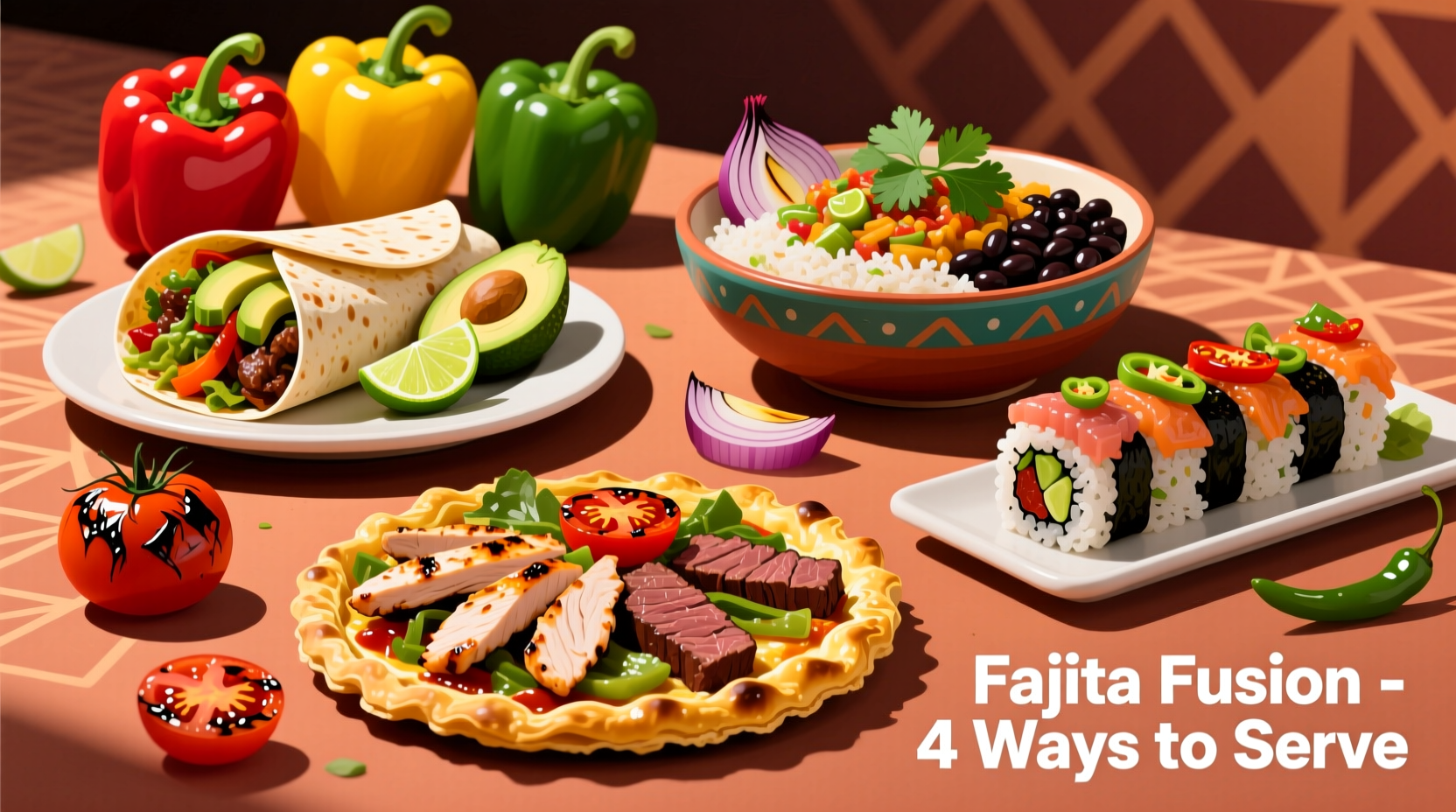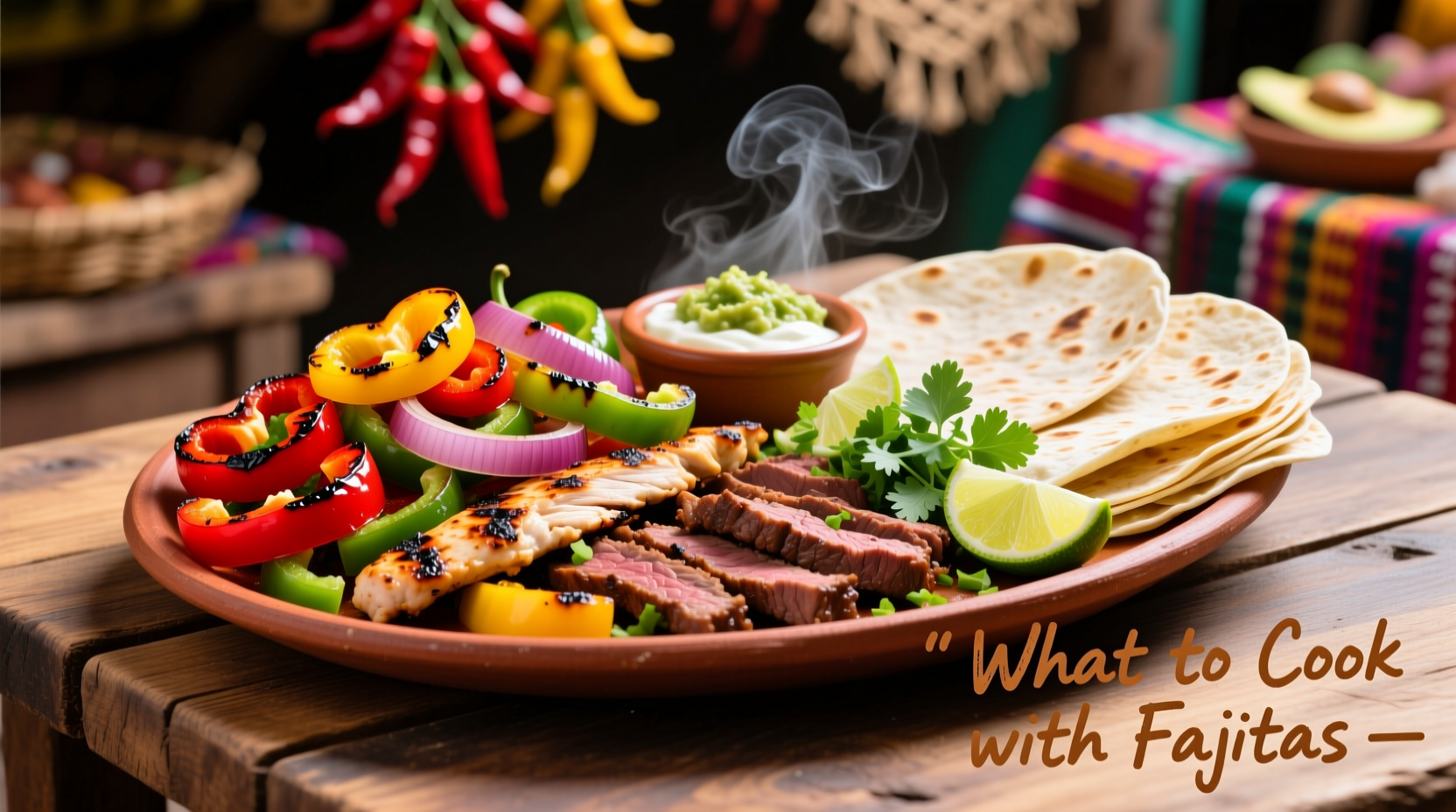When you've got fajita ingredients on hand but want something different from the usual tortilla wrap, these creative solutions maximize your preparation effort. Whether you're working with pre-marinated chicken, steak, or vegetables, these 10 meal transformations require minimal additional ingredients and can be ready in 30 minutes or less.
Why Repurpose Fajita Ingredients?
Fajita components—bell peppers, onions, and protein marinated in citrus and spices—offer incredible versatility. The USDA Food Safety and Inspection Service confirms that properly stored cooked fajita ingredients remain safe for 3-4 days in refrigeration, making them ideal for meal planning (USDA Storage Guidelines). Instead of repeating the same meal, leverage your initial prep work for culinary variety while maintaining food safety standards.
Breakfast Transformations
Morning meals benefit tremendously from fajita ingredients' bold flavors. The Academy of Nutrition and Dietetics notes that incorporating vegetables into breakfast increases nutrient density without compromising taste (Academy of Nutrition Research).
Fajita Breakfast Scramble
Combine leftover fajita vegetables and protein with 4 beaten eggs in a non-stick skillet. Cook over medium heat until eggs set (2-3 minutes). Top with avocado slices and a squeeze of fresh lime. This high-protein breakfast delivers 25g protein per serving and requires zero additional seasoning thanks to the pre-marinated ingredients.
Pepper and Onion Frittata
Pour 6 beaten eggs over sautéed fajita vegetables in an oven-safe skillet. Bake at 375°F for 15-18 minutes until set. The caramelized onions and peppers eliminate the need for additional vegetables, creating a restaurant-quality brunch in under 25 minutes.
Lunch Solutions
Midday meals need to balance speed and satisfaction. These options transform fajita components into substantial lunches without requiring additional marinating time.
Fajita Grain Bowls
Layer cooked quinoa or rice with fajita steak or chicken, roasted peppers and onions. Add black beans, corn, and a dollop of Greek yogurt instead of sour cream. This complete meal provides 45g protein and 12g fiber per serving while using the same ingredients that would go into traditional fajitas.
Stuffed Bell Peppers
Cut bell peppers in half lengthwise and remove seeds. Fill with leftover fajita mixture and top with shredded cheese. Bake at 350°F for 20 minutes until peppers soften. This presentation elevates your ingredients into a visually appealing dish that works equally well for casual lunches or dinner parties.
| Meal Option | Prep Time | Additional Ingredients | Best For |
|---|---|---|---|
| Fajita Pizza | 15 min | Pizza crust, cheese | Quick weeknight dinner |
| Pepper Jack Quesadilla | 10 min | Tortillas, cheese | Kid-friendly meal |
| Fajita Pasta | 20 min | Pasta, olive oil | Meatless adaptation |
| Loaded Fajita Nachos | 12 min | Tortilla chips, cheese | Game day snack |
Dinner Innovations
Fajita Pizza
Spread tomato sauce on a pre-baked pizza crust. Top with fajita vegetables and protein, then add Monterey Jack cheese. Bake at 425°F for 12-15 minutes. The citrus marinade in fajita ingredients creates a bright flavor profile that cuts through the richness of cheese, producing a balanced pizza without additional seasonings.
Pepper Jack Quesadilla
Place fajita filling between two tortillas with shredded pepper jack cheese. Cook in a dry skillet until cheese melts and tortillas turn golden (3-4 minutes per side). Serve with pico de gallo for dipping. This adaptation works particularly well with chicken fajita ingredients, creating a kid-friendly meal that uses the same components in a familiar format.
Fajita Pasta
Toss cooked pasta with fajita vegetables, protein, and a splash of the reserved marinade. Add a tablespoon of olive oil to create a light sauce that coats the noodles. For creamier versions, stir in Greek yogurt instead of heavy cream. This meal transformation demonstrates how fajita ingredients can cross cultural boundaries while maintaining their distinctive flavor profile.

Storage and Repurposing Tips
Maximize your fajita ingredient investment with these professional techniques:
- Separate components: Store proteins and vegetables separately to maintain texture when repurposing
- Reserve marinade: Freeze unused marinade for future dishes (boil before reuse)
- Freeze portions: Divide cooked ingredients into single-serving containers for quick meals
- Revive leftovers: Add a splash of broth when reheating to restore moisture
Dietary Adaptations
Fajita ingredients naturally accommodate various dietary needs with minimal modifications:
- Gluten-free: All base ingredients are naturally gluten-free—just verify marinade ingredients
- Keto: Serve over cauliflower rice or as a salad with avocado dressing
- Vegan: Substitute portobello mushrooms for meat and increase vegetable portions
- Low-sodium: Rinse pre-marinated ingredients and add fresh lime juice for flavor
Complementary Side Dishes
Complete your repurposed fajita meals with these simple accompaniments that require minimal additional preparation:
- Cilantro-lime rice: Stir fresh lime juice and chopped cilantro into cooked rice
- Avocado crema: Blend avocado with Greek yogurt and lime for a healthier alternative to sour cream
- Quick-pickled onions: Soak sliced red onions in lime juice for 15 minutes
- Charred corn: Toss frozen corn in a hot skillet until lightly blackened
Contextual Considerations
Not all fajita ingredient transformations work equally well in every situation. Consider these context boundaries when planning your meal:
- Protein type matters: Chicken fajita ingredients work best in salads and pasta, while steak shines in nachos and quesadillas
- Vegetable texture is key: Overcooked peppers become too soft for pizza toppings but work well in scrambles
- Marinade intensity affects outcomes: Strongly marinated proteins dominate subtle dishes like omelets but enhance grain bowls
- Time constraints determine complexity: Grain bowls require 20 minutes of active cooking while quesadillas need just 10
Frequently Asked Questions
Here are answers to common questions about repurposing fajita ingredients:











 浙公网安备
33010002000092号
浙公网安备
33010002000092号 浙B2-20120091-4
浙B2-20120091-4